Whaley, 45, has attended and participated in probably more than 800 commission meetings while in office, but none perhaps were as bittersweet as the one this week, as she bid farewell to her colleagues and staff and a job that she says she loves.
Whaley said it’s still hard to believe that Dayton voters 16 years ago put their trust in an unmarried woman in her late 20s who lived in a rental in Five Oaks and who did not grow up in the area and did not come from a family with prominent political name recognition.
But she said she’s eternally grateful to the people of Dayton and it’s been honor to serve them, and she believes the city is well-positioned for the future.
“I feel really good,” she said. “I think I left her in better shape than I found her. I’m proud of a lot of the work that we did.”
Commissioner Matt Joseph, who joined the commission two years before Whaley, said “it’s been such a journey” and it was impressive to see her step up to become the leader the city needed during some very challenging times.
“Finally, these last few years have been a tour de force,” he said. “Through your will, knowledge and connections ... you changed the path of the city to a much better one.”
Looking back, Whaley said Dayton was a different community when she joined the commission — for instance, NCR, Delphi and GM were still around.
Within a handful of years, those major employers closed down operations, and back then downtown was mostly a graveyard of empty office buildings and the city continued to profusely bleed population.
The Great Recession also hammered the community, and many homes were abandoned and rotted away, and some neighborhoods looked like war zones.
But Whaley said the city has had a major turnaround and more than $1 billion have been invested in downtown since she was elected mayor in 2013.
She said city leadership helped pave the way for some of the largest and most impactful projects, including by investing in the Dayton Arcade and the Levitt Pavilion Dayton.
The arcade reopened earlier this year after a 30-year slumber, welcoming new residents and tenants like the University of Dayton and the Entrepreneurs’ Center.
The Levitt Pavilion Dayton is a $5 million music pavilion that provides 50 free concerts each year and has activated what was a tired part of downtown.
Whaley also said Dayton’s neighborhoods are in much better shape than they were, especially during and after the recession, partly because the city at her urging started “land banking” properties for future development and it spent tens of millions of dollars on blight removal.
The city’s work to expand pre-K to all 3- and 4-year-old children is one of Whaley’s proudest accomplishments, which she says is an investment in the future.
Whaley said she ran for mayor because she thinks the position should matter and be taken seriously and she claims some previous office-holders treated it like a part-time job.
It’s not an easy role, she said, and the mayor gets blamed for most problems in the city, including many things out of his or her control.
But it also works both ways.
Whaley said shortly after she was sworn in the UD basketball team made a deep run in the NCAA March Madness Tournament.
Many people came up to her to congratulate her for the team’s success.
“I remember I told the dean at UD, I said, “It’s so strange, the team is doing great and people congratulate me,’” she said. “He said, ‘Take the credit because you’re going to get the blame.’ That’s the way the job is.”
Whaley said she won’t miss the late-night texts and calls about homicides in the city or other horrifying acts of violence or crises.
Whaley led the city through some traumatic events, including the mass shooting in the Oregon District, the Memorial Day tornadoes, the KKK-affiliated hate group rally and the COVID pandemic.
“I will not miss having to think about every traumatic death in Dayton every day,” she said. “You really don’t understand how it just wears on you.”
Of course, she’s running for governor and that office often has crises it must confront.
Whaley will be mayor until Jan. 3, when current City Commissioner Jeff Mims is sworn in to office during a special meeting.
Also at that time Commissioner Darryl Fairchild also will be sworn in to a second term, and Commissioner-elect Shenise Turner-Sloss will be sworn in to her first.
Whaley’s final regular commission meeting as mayor was pretty routine, except near the end, when city officials and other members of the commission talked about her contributions and reflected on their time together.
“You might not agree with what the mayor says she’s going to do,” said Commissioner Darryl Fairchild, who at times while in office has butted heads with Whaley. “But when she says she’s going to do something, she acts and does something.”
Fairchild, who got choked up at Wednesday’s meeting while talking about the mayor’s leadership, said Whaley showed great foresight in some of her decisions and she helped position the city for future success.
Commissioner Chris Shaw said Whaley has helped make the city commission one of the most progressive elected city bodies in the state.
Under her leadership, he said, the city has pushed cutting-edge efforts like marijuana decriminalization, legal action against the pharmaceutical companies for the opioid crisis and high-quality preschool for young kids.
Commissioner Mims, who told Whaley he wanted to keep his comments short to avoid getting too emotional, said, “You are a very, very special person and you deserve all of the accolades you can receive.”
About the Author
